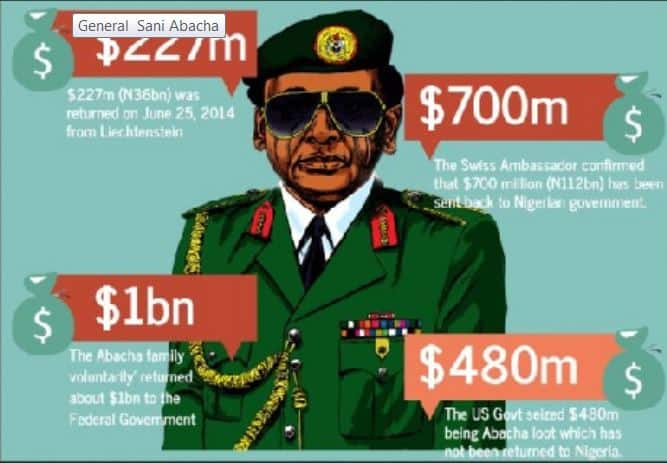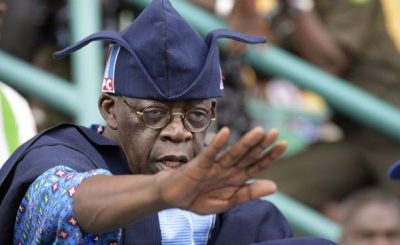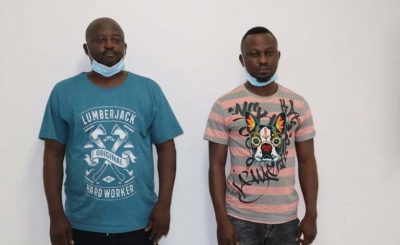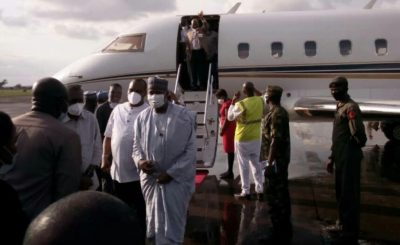Views: 11
$321M Sani Abacha Loot: Nigeria Concludes Negotiation With Switzerland

The Attorney General of the Federation and Minister of Justice, Abubakar Malami, has revealed that negotiations with Switzerland on the return of $321 million recovered from the late Sani Abacha family had been concluded, adding that Nigeria recently recovered $85 million from the controversial Malabu Restrained Funds from the United Kingdom.
The Swiss government has paid $700m of the “Abacha loot” to the Nigerian government in the last 10 years and the outstanding $320m is the last of the money on Swiss soil and will be remitted in the next two to three years, ambassador Roberto Balzaretti, head of the Swiss delegation to GFAR told BBC’s Gbolahan Macjob in a telephone interview.
“The money will be transferred to the Bank for International Settlements in Basel into the Nigerian government account,” he said.
“It will be used to finance projects that will strengthen social security for the poorest sections of the Nigerian population.”
Salihu Isah, Special Adviser, Media and Publicity to Mr. Malami, said the Attorney General stated this in his opening remarks at the Pre-Global Forum on Asset Recovery, GFAR, Consultative meeting with the theme: Building an Ending Framework for Asset Recovery in Nigeria on Thursday in Abuja.
Mr. Malami stressed further that with the conclusion of negotiation, the Memorandum of Understanding will be signed by parties at the Global Forum on Assets Recovery meeting coming up on December 4 to 6 in Washington, and that the repatriation would follow within weeks as agreed by the parties.
He affirmed the need for the international community to ensure the implementation of the measures considered and adopted at the London Anti-Corruption Summit in May 2016.
The AGF also emphasised that Nigeria is more than willing to support the transparent return of stolen assets from Abacha.
He equally urged the international community to improve on procedure for faster return of assets to enable Nigeria to meet the Sustainable Development Goals.
It is widely acknowledged that corruption undermines economic development, political stability, the rule of law, and social development, disrupts social order, and destroys public trust in the governance system. It is an established fact that corruption, which is linked to organised crime, terrorism, and insecurity, is one of the reasons for underdevelopment, he stated.
Mr. Malami reiterated that resources and funds meant for the development of infrastructure in education, health, and security sectors, among others, had been stolen and laundered in different parts of the world.
The minister further reaffirmed that President Muhammadu Buhari, in May 2015, made a commitment to tackle corruption and equally focused on the return of stolen assets from various jurisdictions, and that Nigeria had set clear targets towards improving transparency in the management of assets through the Treasury Single Account (TSA) and the Bank Verification Number (BVN). He also stated that Nigeria had saved a trillion naira through these processes.
Subsequently, under the United Nations Convention Against Corruption implementation mechanism, Nigeria was Peer Reviewed in May 2017 by Myanmar and Côte d’Ivoire in the first year of the second cycle, which covers areas of Preventive Measures and Asset Recovery.
Nigeria has also implemented the United Nations Convention Against Corruption requirement through the development of the National Strategy on Anti-Corruption and is currently reviewing the anti-corruption laws also. The government has signed the Open Government Partnership initiative and completed the National Action Plan for its practical implementation in Nigeria, he said.
He added that he was pleased that the Civil Society Organisations were involved in the negotiation of the Memoranda of Understanding and would also be involved in monitoring the use of the funds.
Earlier in his welcome address, David Ugolor, Director, African Network for Environment and Economic Justice, ANEEJ, noted that Global Forum on Asset Recovery established as an outcome of the London 2016 Anti- Corruption Summit hosted by former British Prime Minister, David Cameron, would build upon the experiences of the Arab Forum on Asset Recovery, AFAR, and the Ukraine Forum on Asset Recovery, UFAR.
According to him, the core objective of GFAR is to convene practitioner experts to provide an effective opportunity for countries to cooperate on asset recovery cases.
It also tries to highlight the importance of strong political commitment, multi-jurisdictional coordination, and practitioner interaction.
Its inaugural meeting will focus on assistance to four priority countries: Nigeria, Sri Lanka, Tunisia, and Ukraine.
He urged the international community to work on the talks by fulfilling some of the commitments made during the London summit, which had direct implications for anti-corruption in Nigeria.
We are eager to see how these commitments would translate to an expeditious return to Nigeria, assets belonging to Nigeria stashed away in the UK, US, and other countries, the ANEEJ boss added.
Mr. Ugolor identified the need for Nigeria to evolve a new national asset recovery design to stem the illicit financial transactions still going on in our national dealings and seek a way to possibly overhaul the existing anti-corruption agencies to grapple with the antics of fraudsters.
He said, Without any shade of doubt, it is obvious that we need a new national asset recovery architecture to deal with the multiple challenges facing our country today.
The anti-corruption agencies will need to explore more creative strategies to respond to the new large-scale indices of corruption in both the public and private sectors.
We need to strengthen our legal and institutional anti-corruption systems through the introduction of an innovative legislative agenda.
The Proceeds of Crime Bill and other anti-money laundering reform bills deserve urgent attention, particularly with the increasing reports of the looting of public resources.
Giving their remarks, the British Ambassador to Nigeria, Paul Arkwright, the Swiss Ambassador, Eric Mayoraz, and Michael Bonner, Senior Police Advisor who represented the U.S. Ambassador in their remarks, commended the Nigerian government for collaborating with Civil Society Organisations to fight corruption and in tackling illicit financial flows.
They pledged the support and cooperation of their home countries in repatriating stolen funds stashed away in banks in their countries back to Nigeria in due course.
On his part, Kole Shettima, Director MacArthur Foundation, also praised the government for getting interest groups on board for the asset recovery drive, but wished that other parties,1 like the Nigerian movie industry known as Nollywood, as well as the media, among others, were involved to be all-encompassing.
Mr. Shettima expressed that he does not want a situation where the Anti-Corruption war would be seen as President Buhari’s or the government’s fight, but to be seen as the fight for all Nigerians.
The money was frozen in 2014 by a Swiss court after a legal procedure against his son, Abba Abacha.
Originally deposited in Luxembourg, it is a fraction of the billions of dollars allegedly looted during his rule from 1993 to 1998.
Recovering the “Abacha loot” has been a major priority for Nigeria.
President Muhammadu Buhari made the recovery of stolen assets a major part of his 2015 election campaign, and this will be the largest yet.
Although an agreement to repatriate the money was signed in March, the Nigerian Ministry of Justice, the World Bank, and Switzerland have been grappling with legal complications surrounding the return of the money they seized from Abacha, says the BBC’s Stephanie Hegarty in Abuja.
However, an agreement setting out how the money would be repaid was signed on Monday by the three parties at the Global Forum on Asset Recovery GFAR in Washington, which means the funds will finally be sent back to Nigeria.
Source: NewsNow
Source: BBC








You must be logged in to post a comment.